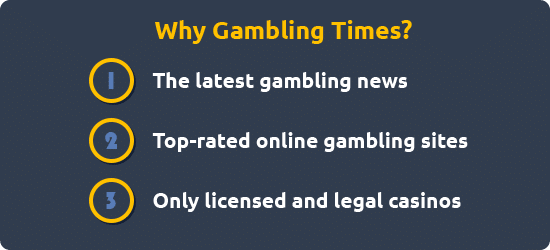What States Is Online Gambling Legal
The best online gambling sites all encourage responsible gambling. You can easily find a place where there is real gambling taking place at the best online gambling casino as well as at gambling websites. Visit the above three websites and see what amount of money they require before you put a strategy to work. Online Gambling And More Sports Betting Legal Friday In Michigan It's official: online gaming and sports betting starts this Friday at noon. Nine operators, including Detroit's three casinos, were authorized by the Michigan. Commercial gambling is legal in 23 states as of the end of 2018, tribal gaming in 29 states, and charitable gambling in all but four states (Utah, Hawaii, South Dakota, and Tennessee). Many states struggle with various issues related to online poker sites, however, such as whether it is a game of skill or chance and if collecting rake is. So far, there are four legal states for real money online poker: Nevada, Delaware, Pennsylvania (where PokerStars launched in 2020 and PartyPoker is expected to follow) and New Jersey. These states require that a brick-and-mortar casino licenses the poker sites. Legal Gambling Ages By State – States Where You Can Play Online Casinos Legally At 18+ The following is a list of all US states that allow you to gamble at 18 years old. Click the links to learn more about specific gambling laws for that particular state and how they implement their minimum gambling age requirements.
- Is Online Gambling Legal In Oregon
- What States Allow Online Gambling
- Online Gambling Is Legal In What States
- Is Online Gambling Legal In Nc
- What States Is Online Sports Gambling Legal
Gambling Law: An Overview
Gambling, though widespread in the United States, is subject to legislation at both the state and federal level that bans it from certain areas, limits the means and types of gambling, and otherwise regulates the activity.
Congress has used its power under the Commerce Clause to regulate interstate gambling, international gambling, and relations between the United States and Native American territories. For example, it has passed laws prohibiting the unauthorized transportation of lottery tickets between states, outlawing sports betting with certain exceptions, and regulating the extent to which gambling may exist on Native American land.
Each state determines what kind of gambling it allows within its borders, where the gambling can be located, and who may gamble. Each state has enacted different laws pertaining to these topics. The states also have differing legal gambling ages, with some states requiring the same minimum age for all types of gambling, while for others, it depends on the activity. For example, in New Jersey, an 18-year-old can buy a lottery ticket or bet on a horse race, but cannot enter a casino until age 21. Presumably, the age 21 restriction is due to the sale of alcohol in that location.
A standard strategy for avoiding laws that prohibit, constrain, or aggressively tax gambling is to locate the activity just outside the jurisdiction that enforces them, in a more 'gambling friendly' legal environment. Gambling establishments often exist near state borders and on ships that cruise outside territorial waters. Gambling activity has also exploded in recent years in Native American territory. Internet-based gambling takes this strategy and extends it to a new level of penetration, for it threatens to bring gambling directly into homes and businesses in localities where a physical gambling establishment could not conduct the same activity.
Internet Gambling
Federal Regulation
In the 1990s, when the World Wide Web was growing rapidly in popularity, online gambling appeared to represent an end-run around government control and prohibition. A site operator needed only to establish the business in a friendly offshore jurisdiction such as the Bahamas and begin taking bets. Anyone with access to a web browser could find the site and place wagers by credit card. Confronted with this blatant challenge to American policies, the Department of Justice and Congress explored the applicability of current law and the desirability of new regulation for online gambling.
In exploring whether an offshore Internet gambling business taking bets from Americans violated federal law, attention was focused on the Wire Act, 18 U.S.C. § 1084 (2000). The operator of a wagering business is at risk of being fined and imprisoned under the Wire Act if the operator knowingly uses a 'wire communication facility' to transmit information related to wagering on 'any sporting event or contest.' 18 U.S.C. § 1084(a). An exception exists if that act is legal in both the source and destination locations of the transmission. § 1084(b). The Wire Act’s definition of “wire communication facility” appears to embrace the nation's entire telecommunications infrastructure, and therefore probably applies to online gambling. See § 1081.

The Department of Justice maintains that, under the Wire Act, all Internet gambling by bettors in the United States is illegal. U.S. House of Representatives Committee on the Judiciary Hearing on Establishing Consistent Enforcement Policies in the Context of Online Wagers, 110th Cong., Nov. 14, 2007 (testimony of Catherine Hanaway, U.S. Attorney (E.D. Mo.), Dept. of Justice). The Fifth Circuit disagreed, ruling that the Wire Act applies only to sports betting, not other types of gambling. In re MasterCard Int’l Inc., 313 F.3d 257 (5th Cir. 2002).
In 2006, Congress passed the Unlawful Internet Gambling Enforcement Act, which made it illegal for wagering businesses to knowingly accept payment in connection with unlawful Internet gambling (though it does not itself make Internet gambling illegal). 109 Pub. L. 109-347, Title VIII (Oct. 13, 2006) (codified at 31 U.S.C. §§ 5301, 5361–67). It also authorizes the Federal Reserve System to create regulations that prohibit financial transaction providers (banks, credit card companies, etc.) from accepting those payments. See 31 U.S.C. § 5363(4). This Act, along with threats of prosecution under the Wire Act from the Department of Justice, has caused several Internet gambling businesses to withdraw from the U.S. market.
In response, House Representatives introduced multiple bills in 2007 to soften federal Internet gambling law. If passed, the Internet Gambling Regulation and Enforcement Act and the Internet Gambling Regulation and Tax Enforcement Act would license, regulate, and tax Internet gambling businesses rather than prohibit them from taking bets from the United States. Alternatively, the Skill Game Protection Act would clarify the Wire Act to exempt certain games such as poker and chess.
State Regulation
In addition to federal measures, some states have enacted legislation to prohibit some types of Internet gambling. In 2006, Washington State amended its Code to make knowingly transmitting or receiving gambling information over the Internet a felony. See Wash. Rev. Code § 9.46.240 (2006). Other states with similar prohibitions have made it a misdemeanor instead. See e.g., 720 ILCS 5/28-1 (2007).

States have not been particularly active in enforcing these laws, possibly due to a conflict with the dormant Commerce Clause doctrine. That doctrine theorizes that state law applying to commerce outside the state’s borders is unconstitutional because that power lies with federal, not state, government. In particular, federal preemption has obstructed states’ attempts to regulate gambling activity on Indian reservations within state borders. See Missouri ex rel. Nixon v. Coeur D’Alene Tribe, 164 F.3d 1102 (8th Cir. 1999). The federal Indian Gaming Regulatory Act, 25 U.S.C. § 29 (2000), governs gambling activity on Indian reservations, but the extent to which it and other federal gambling laws preempt state action in the Internet arena is uncertain.

menu of sources
Federal Material
U.S. Constitution and Federal Statutes

- U.S. Code: Title 15, Chapter 24: Transportation of Gambling Devices
- U.S. Code: Title 15, Chapter 57, Interstate Horseracing
- U.S. Code: Title 18, Chapter 50: Gambling
- U.S. Code: Title 18, Chapter 61: Lotteries
- 18 U.S.C. §1953 (Interstate Transportation of Wagering Paraphernalia Act)
- 18 U.S.C. §1955 (Illegal Gambling Business Act of 1970)
- 25 U.S.C. §§2701-2721 (Indian Gaming Regulatory Act)
- U.S. Code: Title 28, Chapter 178: Professional and Amateur Sports Protection
- Code of Federal Regulations: Title 25, Chapter 3: National Indian Gaming Commission, Department of the Interior
- Proposed Internet Gambling Prohibition Act of 1997 (not passed)
Federal Judicial Decisions
- Greater New Orleans Broadcasting Association, Inc. v. United States, 527 U.S. 173 (1999)
- Ratzlaf v. United States, 510 U.S. 135 (1994)
- Chickasaw Nation v. United States, 534 U.S. 84 (1999)
State Material
Other References
- '14 Charged in Internet Betting' (Washington Post, March 5, 1998)
Is Online Gambling Legal In Oregon

- wex
Pros of gambling online
A modern person has already been surrounded by many activities, such as TV, music and movies. Recently to broad audience video games have been added, as well as various kinds of online gambling games. They have achieved huge success within public. Now there's no point in going outside and making a long trip to Vegas, you can play from every corner of world. Development of games, such as poker, roulette and slots, has given a start to an era of gambling online. Advantages of participating in such events are endless. New gamers can comfortably learn rules and master their skills without being embarrassed or ashamed. As soon as you feel ready to try chances in online gambling for real money you may start contests with players from other towns and states. Finding a proper rival is not a problem anymore, as plenty of people spending hours in attempts to make money. There is a high opportunity to meet a real pro, or a star, or become an idol for thousands yourself. Best online gambling sites offer people numerous opportunities to earn both fame and money.
What States Allow Online Gambling
Legality of online gambling
Online Gambling Is Legal In What States
Majority of countries restrict betting via Internet, but it is allowed in several states in US. Government is very strict about rules of regulations for those providers who offer people online gambling services. They need to get a special license for performing their business. And after that it becomes possible to make ads in mass media including television, radio and even print publications. Notifying audience about tournaments and big prizes organisations attract new players, who are willing to try their chances in winning easy money. Pennsylvania online gambling has reached biggest success within public, promoting numerous events and games. It is 100% legal and secure. If Vegas is mecca for rich people, spending thousands on hotel, planes and restaurants, we can call PA online gambling is a starting point for everyone. No matter how luxurious your clothes are, no matter in what town you live and how you look, there's a possibility for everyone to become a new star!
Is Online Gambling Legal In Nc
Negative aspects of gambling
What States Is Online Sports Gambling Legal
It all sounds like a dream, but a reasonable person will always think of some pitfalls of betting. First, you might get addicted to it and spend all your free time online trying to win bigger and bigger prise. Second, and that's even worse, amount of money on your bank account may reduce, not grow. Third, after losing your cash, you might start borrowing funds to play again. Making a decision to stop after unsuccessful games is a true characteristic of wise and mentally stable person